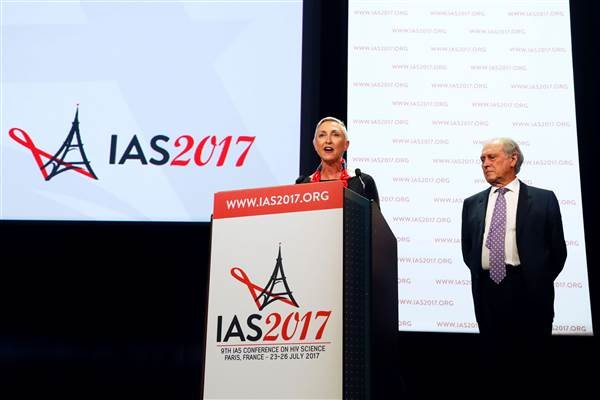A 9-year-old child born with the AIDS virus was treated briefly with antiretroviral medication as a baby and is now reported to be free of the infection. The rare but stunning case of wiping out the virus that causes AIDS for years after treatment holds promise for all patients with HIV, infectious disease experts said Monday.
The case of the South African child, whose gender and identity were kept secret, was one of the highlights of the opening day at the international AIDS conference in Paris. Eight-and-a-half years after treatment, the child shows no signs of infection, adding another piece to the puzzle of eliminating human immunodeficiency virus.
The current standard of care is to start HIV-infected babies on antiretroviral drugs, known as ART, as early as their diagnosis and treat them for the rest of their lives. Doctors have long known that while HIV-treatment is life-saving in these children, there are concerns about the side-effects and health impacts of lifelong therapy with these powerful drugs.
“The fact that you can go so long without a rebound shows that it is possible to suppress the virus. It gives us hope that we may be able to do the same in more than just children,” Dr. Anthony S. Fauci, director of the National Institute of Allergy and Infectious Diseases of the National Institutes of Health told NBC News in an interview from Paris, where he is attending the conference.

International AIDS Society president Linda-Gail Bekker and President of the French National Ethics Advisory Committee and conference chairman Jean-Francois Delfraissy speak at the opening of the 9th International AIDS Society conference on HIV Science on July 23, 2017 in Paris
The child at the center of Monday's announcement was one of 377 HIV-infected children in a research trial that investigated the possibility of treating children with ART and then stopping the treatments for extended periods.
As a 32-day old infant diagnosed with HIV, the South African baby received medication that stops the AIDS virus from replicating. By 40 weeks, the baby’s immune system was in good shape with no symptoms of the disease. Dr. Mark Cotton, professor of pediatrics at Stellenbosch University in South Africa, who co-led the study says most importantly doctors found no evidence of an inactive HIV infection.
“Our team has been keeping an eye on the viral loads and we’re seeing that there’s no detectable virus in the child’s blood.”
Why This Child?
The most intriguing question for scientists now is figuring out what makes this child’s immune system so special. Some people have genetic mutations that enable them to better deal with an HIV infection, but according to the researchers, the nine year old doesn’t have a gene that gives natural resistance to HIV infection. Beginning drug treatment early is key, but it’s not the only answer.
“We think it was a combination of receiving early treatment and some factors in the immune system that controlled the virus," Cotton told NBC News
Very gud post
Follow n upvote
Downvoting a post can decrease pending rewards and make it less visible. Common reasons:
Submit
very good post
Downvoting a post can decrease pending rewards and make it less visible. Common reasons:
Submit
Nice post
Downvoting a post can decrease pending rewards and make it less visible. Common reasons:
Submit
Nice post
Downvoting a post can decrease pending rewards and make it less visible. Common reasons:
Submit